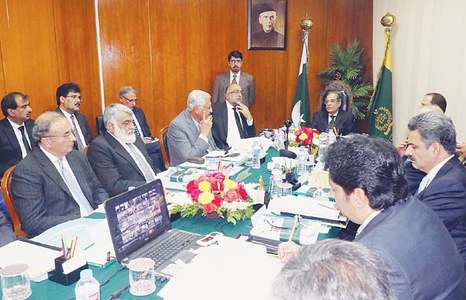ISLAMABAD: The treasury benches during the Friday session of the National Assembly blamed the judiciary and the establishment for not allowing the government to function as it wanted to make ‘due reforms in the judiciary and some other institutions’.
Sharp criticism was levelled at the state institutions just weeks after the ruling Pakistan Muslim League-Nawaz parliamentary body meeting had decided to discuss judicial activism and judges’ behaviour in parliament.
Taking up the matter on the floor of the house, Minister for Kashmir Affairs and Gilgit-Baltistan Chaudhry Mohammad Birjees Tahir complained that the government wanted to make due reforms in the judiciary as well as some other institutions but it was not being allowed to do so.
“Earlier the President of Pakistan had powers to appoint judges but this power was snatched. Similarly, a parliamentary committee was empowered to appoint judge under 18th constitution amendment but it was also made helpless in making such decisions,” said the minister.
“Parliament should be given respect,” he added.
Advising all institutions to avoid confrontation by working within their respective constitutional domain, Mushahidullah Khan, the spokesperson for the PML-N and minister for climate change, said: “I cannot understand whether the right to rule rests with the people of Pakistan, the judiciary or a specific institution,” he said.
“The government is being accused of lack of governance but in fact it is not being allowed to govern,” Mr Khan said, adding that the basic responsibility of the judiciary was to provide justice to the people instead of water and other civic amenities.
“Judiciary and the parliament should perform their own separate duties, otherwise there will be chaos in the country,” the minister said.
Mr Khan said the PML-N government had not been allowed to function since day one yet the government managed to work on its agenda of development and public welfare during the past four years.“It will not be a good sign for the democracy if judiciary interferes within the domain of the executive.
“No judge should become controversial as such controversies can cause problems,” he warned.
The minister said PML-N Quaid Nawaz Sharif, the former prime minister, was not disqualified on corruption charges. He said people had rejected the decision of Mr Sharif’s ouster that’s the reason they were still with him.
Mr Khan said the parliament was the supreme institution because it enjoyed more authority and supremacy than any other institution. “The parliament has the prerogative to govern and no other institution could infringe its right,” he reiterated.
Sharing similar views and complaints, Minister for Kashmir Affairs and Gilgit-Baltistan Chaudhry Birjees Tahir said the government had planned to reform several institutions including the judiciary but it was not allowed to do work on that plan.
He said the parliamentary committee that had the right to appoint judges under the 18th constitutional amendment had been made helpless. Earlier the president had been deprived of his powers to appoint to judges, he added.
During his speech Jamaat-i-Islami lawmaker Sher Akbar Khan drew the attention of the chair towards the lack of quorum. Subsequently, Deputy Speaker Murtaza Javed Abbasi prorogued the session.
Earlier when the lower house discussed the issue of bank loans waived off by the government, Speaker Sardar Ayaz Sadiq directed the finance ministry to provide within 15 days a complete report of loans written off by the PML-N government.
Criticising the government for raising the prices of petroleum products, the opposition parties including PPP, PTI, JI and JUI-F demanded immediate withdrawal of the recent hike. In his response to the demand, Finance Minister Rana Afzal said the Oil & Gas Regulatory Authority (Ogra) had recommended 31 per cent increase in the petroleum prices but the government raised between four to nine per cent only. The government was still bearing Rs4.2 billion subsidy on petroleum products, he said, explaining that the petroleum prices in Pakistan were still lower than those in neighbouring countries.
Published in Dawn, March 3rd, 2018













































